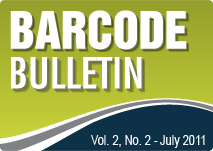Huge interest in Adelaide conference
 The Fourth International Barcode of Life Conference, to be held in Adelaide from November 28 to December 3, has smashed records for the number of abstracts submitted by potential presenters.
The Fourth International Barcode of Life Conference, to be held in Adelaide from November 28 to December 3, has smashed records for the number of abstracts submitted by potential presenters.
When submissions closed on June 30, a grand total of 487 abstracts had been received from 57 countries.
"This has easily surpassed levels of interest leading up to the 2009 Mexico City conference - 255 abstracts from 44 countries," said David Schindel, Executive Secretary of the Consortium for the Barcode of Life (CBOL), which is organizing the conference.
Click photo to enlarge
And while the Program Committed suggested 30 topics for potential sessions, people submitting abstracts proposed an additional 19 session topics, more evidence of the exuberant growth of barcoding at the grass-roots level.
What will be the principal themes in Adelaide? Here are some of the main attractions as revealed by the abstracts:
1. Barcoding is now a mainstream tool in taxonomy. Specialists in an increasingly diverse array of taxonomic groups will have many opportunities for discussions with other experts in their fields.
2. There has been tremendous progress on barcoding fungi. The Fungal Working Group is expected to announce formal approval of a standard BARCODE region at Adelaide.
3. The use of next-generation sequencing for environmental samples has grown considerably.
4. Barcoding activities have expanded into new geographic areas and habitat types, ranging from the Himalayas to subterranean zones.
5. Plant barcoding has expanded dramatically since announcement of the standard barcode regions for land plants at the Mexico City conference.
6. Barcoding applications have diversified and expanded into areas such as ecological studies, all-taxa biodiversity inventories, species conservation, environmental quality assessment, and identification of agricultural pests and disease vectors.
7. New barcoding facilities and national networks have been established and are thriving.
The Program Committee and session organizers are currently reviewing abstracts and assigning them to conference sessions and poster display areas. Those who have submitted abstracts and travel bursary applications will be informed of the results in early August.
During the two days before the conference (November 28 and 29) newcomers to barcoding can attend introductory training sessions - the first devoted to Barcode of Life Data Systems (BOLD) and other informatics platforms, the second offering a short course on lab protocols, organized by CBOL’s Leading Labs Network.
For the four days of the actual conference, the Program Committee has planned a stimulating mix of formats:
• Plenary sessions on the first and last days;
• A session devoted to visiting poster presentations and exhibit booths;
• A session of four parallel sessions for general-interest presentations on plants, invertebrates, vertebrates and fungi/microbes;
• Three sessions with parallel meetings devoted to taxonomic groups and thematic topics; and
• A half-day of free time to explore Adelaide.
"Organizers of parallel sessions will have complete freedom to design the kind of sessions they think will be most interesting to the community with a mix of short oral presentations, poster presentations, workshop interactions and discussion," said Schindel.
Back to Barcode Bulletin Index


 Boom time for DNA barcoding
Boom time for DNA barcoding